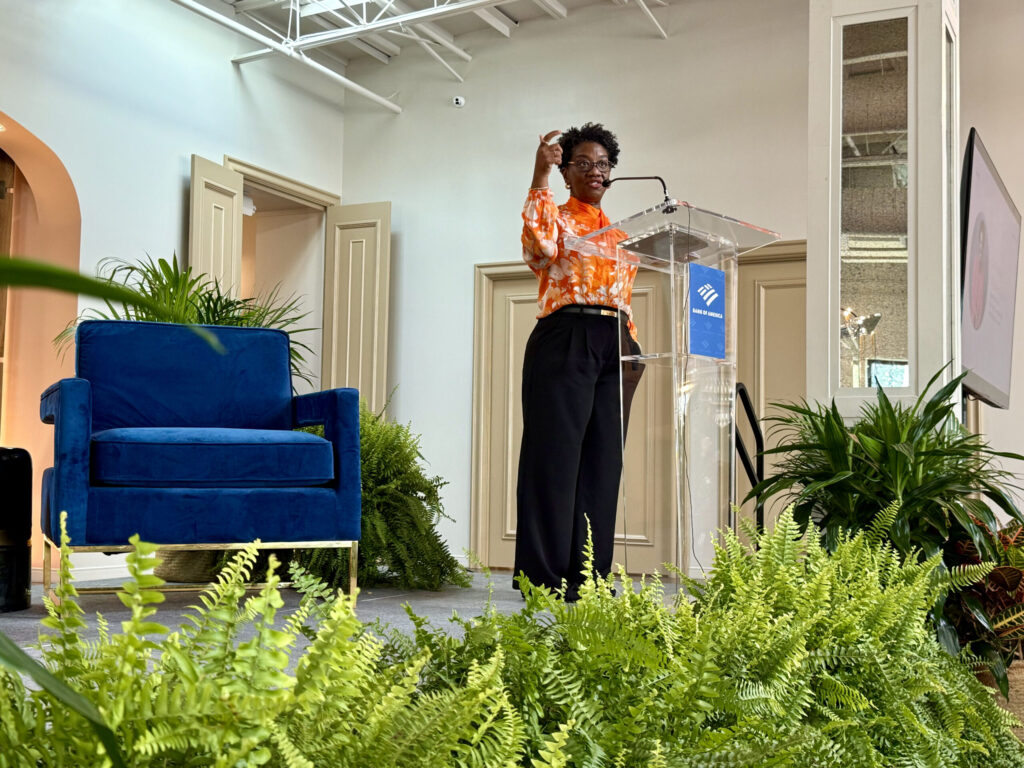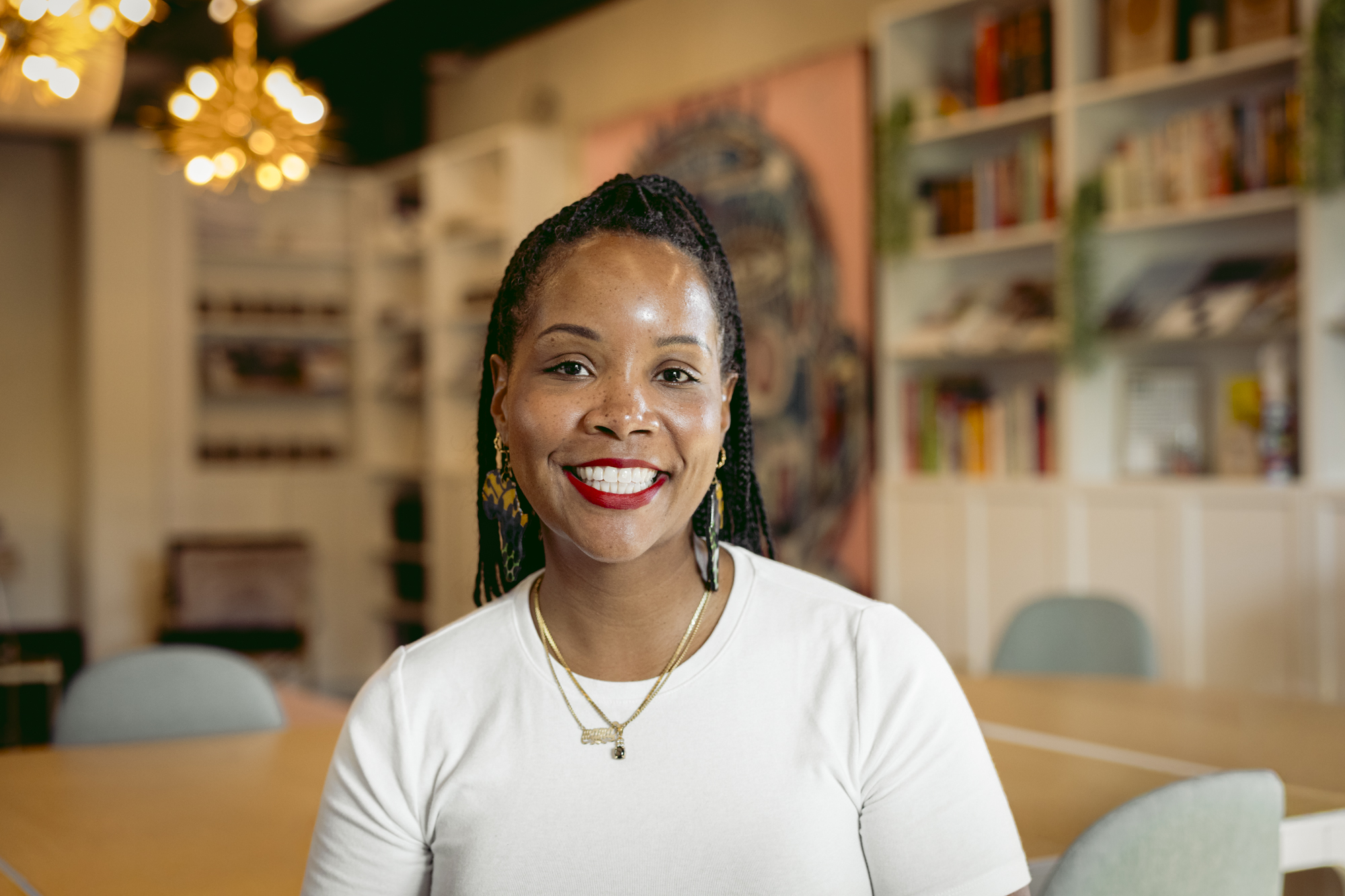Sherri Chisholm granted herself one night of joy in July, to shed the weight of the city and nation from her shoulders, with friends at a concert in Atlanta. Then the lights went down, and Beyoncé delivered a different message.
Chisholm is the executive director of Leading On Opportunity, a nonprofit formed after Charlotte ranked dead last — 50th out of 50 — in a Harvard study of economic mobility in major U.S. cities. In short, the 2014 study found that children born into poverty here were more likely to remain in poverty throughout their lifetimes than poor children in any other large U.S. city. The ranking zapped city boosters, and forced them to action.
Chisholm took on the initiative in 2020, just as many of the philanthropists who founded it were moving on to other roles or retiring. In 2024, the same Harvard researchers, led by Raj Chetty, released an updated ranking that showed Charlotte had climbed to 38th out of 50, the most growth of any city. Chetty visited for an event at the Mint Museum last September and offered considerable praise. But success opened the door to new troubles: complacency and changing priorities.
By this summer, Chisholm was feeling burdened. Federal cuts, a hostile political climate for equity work, and a city consumed by controversies at city hall and rising crime near Uptown made it harder to keep LOO’s work at the forefront. How, Chisholm wondered, could she and her team make “opportunity” a priority, with so many other things swirling? How could Charlotte keep making progress in a time of great upheaval for the nonprofit sector?
For Chisholm, the worries became personal: How could she ensure her 4-year-old daughter was part of a generation that put a period on Charlotte’s mobility woes?
Heavy questions led to a heavy heart. So Chisholm gave herself one night off in Atlanta.
The lights went down. Dancers pranced on stage. The crowd screamed. Then Beyoncé appeared, head down under a cowboy hat, and the song “Ameriican Requiem” began with the lyrics …
Can we stand for something? Now is the time to face the wind.
For Chisholm, the lines landed not as an escape but as a charge.


This past Tuesday, Chisholm was on a stage herself, looking out at a room of political and business leaders from Charlotte and several other cities, and she outlined Leading On Opportunity 2.0. People from Wilmington, Greensboro, Atlanta, Philadelphia, St. Louis and elsewhere had flown or driven in to try to take pieces of Charlotte’s solutions back home.
“We’re building a model, not only for Mecklenburg County, but a model for the Carolinas,” she said. “The next decade will focus on ensuring every child in the Carolinas has a real chance to thrive, and the next decade begins now.”
LOO is embarking upon a $5.4 million campaign and, later this month, will launch a meatier version of its data tool, the Opportunity Compass. The new version, which I previewed last week, breaks far more ground than the original. The tool turns complex numbers into accessible insights for policymakers and foundations. Beyond that, it reveals who’s funding what, lists nonprofits working in the target areas, clarifies common metrics, measures progress, and aligns programs and investments, says A.J. Calhoun, a Charlotte native and LOO’s director of research.
The new compass includes good news and disheartening news.
First, the bad: The new compass shows that in 2015, 47 percent of all rental units in Mecklenburg were “affordable” (which LOO defines as less than $800 per month). By 2022, only about 8 percent of units fit.
But the good: In pre-K, Mecklenburg County had about 4,900 public seats for students in 2018; by 2022 that number was 6,594. The percentage of all local pre-K-aged students enrolled in a program jumped from 48 percent to 57 percent in those four years. That will be welcome news to funders who’ve been impatient since the county voted to invest millions in pre-K in 2018.
“Maybe that’s unique to our community,” Chisholm says of funders’ restlessness. She said that Chetty told her last year that “It’s only been 10 years” since the first study. And she whispered back, “You cannot say that here. The expectation is that everyone is middle class, has a dog and whatever, within a quarter.”
The longer-term goal now, Chisholm and Calhoun say, is to expand Leading on Opportunity’s work to other cities in North Carolina and the region. Chisholm is already advising people in places like Atlanta, which ranked 50th out of 50 in the recent Chetty update.
That part made me smile for another reason: A frustrating element of the conversation around crime over the past two months has been around homelessness and poverty. Criticism of the justice system and local policies around crime are fair, and even were acknowledged at a Center City Partners forum this past week. Missing from the rhetoric around our most vulnerable residents, though, is this: A portion of people experiencing homelessness in Charlotte come from elsewhere in the state and region, hoping to tap into local resources. I saw this firsthand while spending 10 days in the “tent city” encampment that formed near Uptown during the pandemic.
So it seems to me that a good way to address homelessness in Charlotte — and its occasional companion, desperation — would be to have a strategy to improve people’s outcomes throughout the Carolinas. Maybe even create a statewide economic mobility strategy.
Calhoun said it best at Tuesday’s event. He said it’s time to stop concerning ourselves with “50th out of 50” or even “38th out of 50.” Each city should only measure itself against its own goals.
“The Opportunity Compass doesn’t compare Charlotte to any other place, because our goal is not to improve at the expense of any other city,” Calhoun said. “Charlotte doesn’t get better because Atlanta and Detroit and Baltimore and Dallas and Nashville and Austin get worse.”


Beyoncé kept singing, and Chisholm kept feeling like the words were meant for her.
Looka there, looka in my hand. The grandbaby of a moonshine man. Gadsden, Alabama. Got folk down in Galveston, rooted in Louisiana.
Chisholm believes the artist’s 2024 country album, Cowboy Carter, is a “love song to Black Americans.” Chisholm’s grandmother took part in the Great Migration of the 20th century, moving from Alabama to the Midwest. Chisholm’s mother helped integrate Western Michigan University, where racist epithets were written on her dorm room door. Her father worked for a railroad company and faced discrimination there.
Chisholm spent the first half of her working life trying to make them proud and live up to their standards. After earning a bachelor’s from the University of Michigan, she went on to Harvard for a graduate degree in education. She came to Charlotte from Detroit, where she’d been the executive director of an educational nonprofit that helped low-income students land internships.
In Charlotte, she walked into a community that had spent six years studying the causes of economic immobility — early childhood education, college and career readiness, family stability, transportation, segregation, housing, etc. — but one that needed a strategy.
She worked quietly to make hires and create a tool for people across the community to use and measure success. She met with funders and foundations and neighborhood groups. Other cities noticed Charlotte’s improvement last year and called Chisholm to share her insights. She’s traveled all over the country, speaking and meeting with others.
Meanwhile, the funding landscape was shifting. Nonprofits like MeckEd and Community Link folded this year. Doubt crept in.
“Everybody I talked to, most conversations ended in tears,” Chisholm told me. “They were feeling it too and not knowing what to do with those feelings.”
The conversations weighed on her.
“As someone who is Black and a woman and leads change work, I think the expectation, or I feel the expectation, is to be hopeful. I want to be hopeful. And sometimes that’s really hard. Like, sometimes I feel sad.”
So she stood and watched her favorite artist sing songs that spoke to her, and she came home and started writing.


Tressie McMillan Cottom is a New York Times columnist, a professor at UNC Chapel Hill, and a mighty Charlotte success story. She spent her teenage years living in Derita and attended West Charlotte High School in the early 1990s. This was during the brief quarter-century when CMS deployed busing, under the orders of the Supreme Court, to achieve desegregation.
West Charlotte was a lantern for what a public high school in America could be — diverse, high-achieving, and graduating future leaders like former Secretary of Transportation Anthony Foxx, former Panthers interim coach Steve Wilks, and former U.S. Attorney Anne Tompkins.
Cottom graduated in 1994 and moved on to N.C. Central University. A few years later, a lower court ruled that Charlotte had achieved integration, and that busing was no longer needed. Soon the school resegregated, and by the 2020s it was overwhelmingly nonwhite.
“West Charlotte really did stand out as an example, that something else was possible,” she said on Tuesday during her keynote address at the LOO gathering. “There was no sense that ability was white or deviance was nonwhite. This meant a generation of emerging young adults never got the message that going to college or achieving was conditioned on race or class. And let me tell you, we graduated from west Charlotte and went out into the world, and we were a little surprised.”
Her point was that success can breed complacency, and complacency can spiral into backtracking. When West Charlotte thrived, the community and the courts claimed integration a success, a box checked, and did away with the model. It’s a cautionary tale for Charlotte’s opportunity work, she said.
“Public taste will fade. The thing you’re building won’t always be fun and exciting to people. Funding priorities will change,” she said. “But we can do this. I know that because we did it before.”
“This is a long haul. You don’t solve intergenerational mobility in one generation.”


Chisholm sat down at her computer in late July, a few weeks after the concert, and typed out a letter to other nonprofit leaders, funders, and her team — and maybe even to herself.
“The anxiety is thick,” she wrote. “It lingers like smoke, suffocating our breath and clouding our vision. Each time an organization shrinks or disappears, I choke back fear, wondering if my team will be next.”
But later:
“I refuse to go out like that. We refuse. … I am committed to creating a Charlotte where my daughter will be thriving here 30 years from now … in a city where little Black girls with braids grow up in a community that believes in their brilliance.”
The post was a rarity for a Charlotte organizational leader in 2025. Most have tried to shy away from equity work, or at least do it quietly, not wanting to be painted by the next viral hellscape. The post made a splash on LinkedIn, but more than that, it circulated among Charlotte’s leadership circles as a rare moment of vulnerability and honesty from someone in a prominent position.
The subtext was clear: Now in the middle of her career, Chisholm is no longer fighting the fight of her grandparents and her parents, or even that of her predecessors in economic mobility work in Charlotte. She intends to lead in her own way, as her own person — full of hope and despair, hard work and family time, meetings and motorcycle rides.
She titled her post, “Blackbiird,” after Beyoncé’s remake of the classic Beatles track from 1968. That year, of course, was another disorienting moment in American history. The closing lines ring true for Chisholm, and for the future of “opportunity” in Charlotte.
You were only waiting for this moment to arise.
